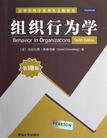组织行为学
2012-12
杰拉尔德•格林伯格 (Jerald Greenberg) 清华大学出版社 (2012-12出版)
杰拉尔德·格林伯格
661
《清华管理学系列英文版教材:组织行为学(第10版)》是一本兼具理论性与应用性的组织行为学教材,将个体行为、群体行为和组织行为方面的重要观点与现实世界的敏感性、需求及实践完美地结合起来。其最大特色是,着眼于提供读者真正想知道和需要知道的东西,具体体现在以下方面: 很好地平衡了基础科学与实际应用,将研究、理论和实际应用三者融为一体,非常明确地指出这些理论正如何应用于当今的组织中。 很好地平衡了知识与技能,告诉读者如何运用相关知识去做具体的事情,有利于读者技能的开发。 写作风格友好随和,资料选择和内容编排独具匠心,使读者更容易掌握组织行为学知识,并理解工作场所行为的“真正意义”。 《清华管理学系列英文版教材:组织行为学(第10版)》适合用做本科高年级学生、MBA及研究生教材,也非常适合职场人士阅读使用。
作者:(美国)杰拉尔德·格林伯格(Jerald Greenberg) 杰拉尔德·格林伯格(Jerald Greenberg),美国俄亥俄州立大学管理学与组织行为学教授,拥有韦恩州立大学产业与组织心理学博士学位。格林伯格教授担任许多组织的资深顾问,主要研究组织公平、职场偏差行为、商业伦理等。他曾担任美国管理学会组织行为学分会的主席,其编写的《组织行为学》是该领域的经典畅销教材。
第1篇 组织行为学概论 第1章 组织行为学简介 第2章 组织公平、组织道德和企业社会责任 第2篇 基本的人类进程 第3章 感知与学习:理解和适应工作环境 第4章 个体差异:个性、技能和能力 第5章 组织生活:环境与压力 第3篇 组织中的个人 第6章 工作态度:偏见、工作满意度和组织承诺 第7章 组织中的激励 第4篇 群体动力学 第8章 群体动力学与工作团队 第9章 组织中的沟通 第10章 组织中的决策 第11章 工作中的人际关系行为:冲突、合作、信任和离经叛道 第5篇 影响他人 第12章 权力:在组织中的使用与滥用 第13章 组织中的领导 第6篇 组织进程 第14章 组织文化、创造力和创新 第15章 组织结构与设计 第16章 管理组织变革:战咯计划和组织发展 附录 附录1 了解组织中的行为:理论与研究 附录2 理解与管理职业生涯 词汇表
版权页: 插图: Abilities and Skills: Having What It Takes to Succeed As you know from experience, people differ greatly with respect to their abilities-the capacityto perform various tasks-and skills-dcxtcrity at pcrforming specific tasks, which has bccnacquired through training or cxpericncc.57 For example, no matter how hard the author of thisbook might have tricd, hc never could have made it as a professional basketball player. He's nei-ther suffcicntly tall nor athletic to succeed. In othcr words, hc lacks the basic physical abiliticsrequircd by this sport. However, hc has othcr abilities-at least, hc likcs to think that hc does-that have allowed him to enjoy a fulfilling life outside of professional sports. Both abilities and skills arc important, of course, but since abilities arc morc general in natureand have implications for a broader range of organizational behavior, we'll pay a bit morc attentionto them in this section of the chapter. Our discussion of abilities will focus on two major types:intellectual abilities (or simply, intelligence), which involve the capacity to perform various cogni-tive tasks, and physical abiI#ies, which refer to the capacity to perform various physical actions.Intelligence: Three Major Types When most people speak about intelligence or intellectual abilities, they generally are referringto one's capacity to understand complex ideas. Of course, this is certainly very important.58 Tosucceed on a job, one must have the mental capacity to undertake the intellectual challengesassociated with it. However, this kind of mental prowess is not the only kind of intelligencethere is.59 In fact, on the job, several distinct types of intelligence have proven to be very impor-tant. We now consider these.
《清华管理学系列英文版教材:组织行为学(第10版)》适合用做本科高年级学生、MBA及研究生教材,也非常适合职场人士阅读使用。
